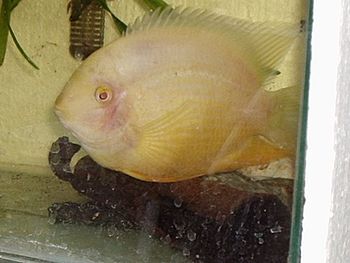 |
| Heros severus (Cichlasoma severum) "Gold" (Photo credit: Wikipedia) |
Due to their size, these cichlids are best kept in aquariums that are large enough for them to be comfortable in. These cichlids also like to swim all over the aquarium so make sure that they have plenty of swimming space.
Gold severum cichlids are also known as hero cichlids or banded cichlids. The latter name is due to the bands that they have on their bodies. These bands consist of around 7 to 8 stripes which are most vivid on baby cichlids. Once they reach maturity, these bands become less vivid. Male and female cichlids usually have the same color although the females appear paler in comparison to the males.
In addition to that, the females also do not have the pattern on the forehead as the males. These cichlids are particularly hard to breed due to the fact they are very particular when it comes to choosing their breeding partners. But when they do spawn, these cichlids become very territorial and aggressive which makes them very protective of their brood. Gold severum cichlids are open breeders which means they'll lay their eggs on open and flat surfaces.
Gold severum cichlids are omnivorous by nature which means that they'll eat both plants and creatures. But when feeding these cichlids you should stick to their natural diet which means it should contain a lot of vegetable ingredients. They would do well when fed with flake foods, pellets and live worms.
When treated properly and kept healthy, the lifespan of a gold severum cichlid is said to reach over 10 years.
In conclusion, keeping and breeding cichlids is a very satisfying and challenging hobby. Thus, it is very important that you know the secrets of taking care of your cichlids.
|

No comments:
Post a Comment